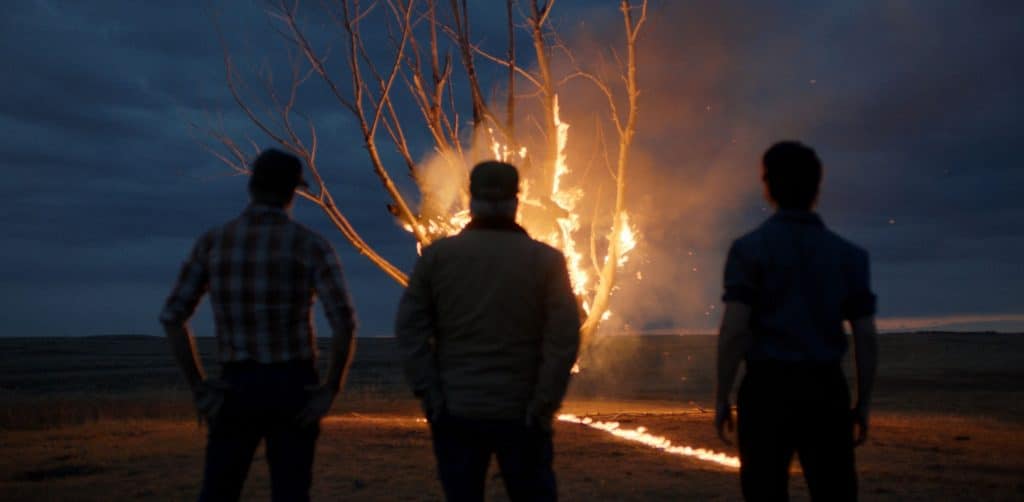“I wanted to love this film so much…”

Review by Kyle Levesque
Listen. Before we get into it, I need to clarify: This is not the review I wanted to write – nor is it the review I was expecting to write.
Hell, before the last twenty odd minutes, I was planning on writing a glowing review of Hands That Bind, one of the feature films in this years’ Edmonton International Film Festival.
I loved, out of the two hour run time, the first hour and a half. The writing was subtle, intelligent, and realistic, the characters likeable and intriguing, the cinematography breathtaking, the scoring absolutely beautiful. There were some slight hiccups – certain characters felt out of place, and the film struggled with its identity, but the rest of the work was so powerful, I wasn’t concerned. I reasoned the ending would balance all of that out.
For the first three quarters of the film, I felt like I was watching a real, honest, classic-in-the-making Canadian Gothic. Writer and director Kyle Armstrong and cinematographer Mike McLaughlin captured the rolling wheat-fields, the endless, cloudless blue skies, and aching, battered farm-houses of Southern Alberta in such a beautiful palette, with so much passion and tenderness and honesty, the film became, on the aesthetical level, an absolute masterclass in cinematography.
Musically, an understated, low-hanging synth and string score, subtly influential and echoing in simplicity, mirrored the wide, endless landscape perfectly. To drive the nail even deeper, Armstrong managed to pull out tremendous performances from his entire central cast, which includes Paul Sparks (of Boardwalk Empire, House of Cards) as the protagonist Andy, Academy-award winning Bruce Dern (Nebraska, The Hateful Eight) as Hank, Landon Liboiron as Dirk, Nicholas Campbell as Mac, and Susan Kent as Susan. There’s some decent names here, all of whom did wonderful work.
Damn I loved this film.
Until the fucking ending. This film is a tragedy, and, though it feels like getting my arm stuck in a combine saying it, not in the way it hopes to be. This film is a tragedy because of how much it had going for it, and where it ended up.
As a note, if you intend to watch this film, be aware of spoilers ahead.
Before we get into the review, a quick run through of the plot. Hired farm-hand Andy (Paul Sparks), loyal and Protestant-farmer hard working, hopes to take over the farm from Mac (Nicholas Campbell) on the elder’s passing. However, when Dirk (Landon Liboiron) comes back from the Oil fields to reclaim his birthright unexpectedly, Andy is pushed further and further into depravity and neglect by his boss, family, and community. The plot borders and pushes against the supernatural as it follows Andy’s descent into madness and immorality.
There are so many countless, pointless, questions left unanswered. I understand that this film aspires to fall within the Gothic tradition, which, at its best, explores the psyche, the soul, and the interiority of the individual, through and alongside perilous, uncanny imagery. Gothic literature, so too, often leaves a great number of questions for the audience to fill in, a huge amount of ambiguity designed for the reader to approach and interact with. All wonderful things to aspire to, work towards.
But this film doesn’t ask those questions with enough strength, enough conviction, to warrant a meaningful dive into them on the part of the audience. No, Hands that Bind either doesn’t know which questions it wants the viewer to answer, or it asks so many in such a muffled tone, the audience can’t catch any of them.
There’s no point investigating the homosociality of Dirk and Andy, because the film doesn’t see any real point to it. There’s no point investigating the aliens, because the film doesn’t see any point. There’s no point to Mack’s tragedy, or Andy’s death, or the mutilated cows, or Andy’s unexplored past, or Hank’s suicide, or Andy’s dead/missing Father, or the nightmares, or the supernatural, or literally anything else, because the film doesn’t see the point.
So, too, do I understand that Gothic stories deal extensively with aspects of the supernatural. The difference between, unfortunately, the supernatural presence in classic Gothic fiction, and in this film, is the supernatural isn’t classically used entirely and solely for aesthetic purposes. What was the point of the skinned cows, other than the imagery? The burning tree, other than that one shot (which, at best, is little more than an allusion to Tarkovsky’s The Sacrifice)? The cannibalism, the dream-nightmare sequences, the black car, the abstraction, the horror, hell, the entire aliens subplot, what was the point? Did this film know? Did Armstrong?
And that’s the tragedy of this film: around the corner, there is a genuine Canadian masterpiece. A poignant exploration into Albertan farmers, mental health, Protestant Stoicism, Canadian history, colonialism, land ownership, homoeroticism, the list goes on and on and on. These are all things the film touches on, brushes against… but nothing comes of any of it.
Sure, there are other gripes one could make: there’s an identity crisis going on here, in that some beats are told with masterful subtlety, others feel like straight pulls from 80’s slashers, but it feels a waste of time to discuss that. The tragedy of this film is simple, straight up, writing. Armstrong built an expansive world for himself, envisioned it beautifully, then got completely lost in it.
I wanted to love this film so much. And even with its flaws, I can’t help but love parts of it. But damn if that final act didn’t drop the ball.
If Armstrong releases, say, a photo-album showing shots from the film, I’d buy it. A soundtrack, in an instant. But heartbreakingly, I can’t recommend the film itself, unless you’re ready to drown in the disappointment.
I hate to make the comparison… but if you watched Game of Thrones, you’re familiar with the feeling this film will bring.

